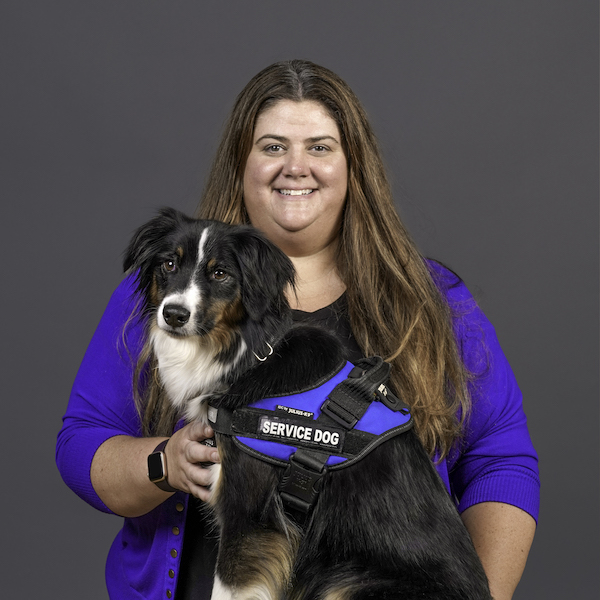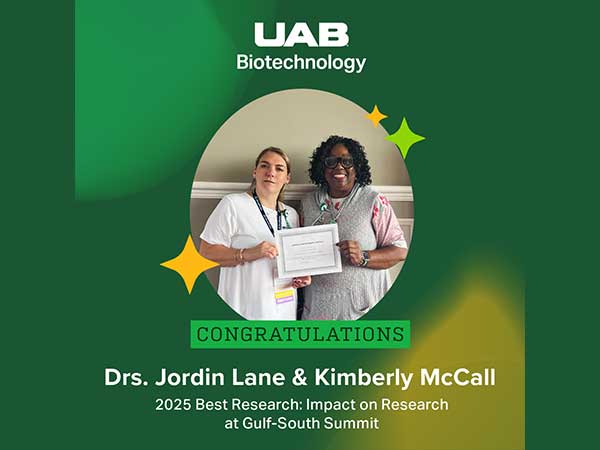 Arrow and Meghan MillsOn most days, the new operations manager at the SHP Research Collaborative can be found ensuring the printer is working properly or troubleshooting fixes to video conference rooms or dealing with other day-to-day HR matters. But, Dr. Meghan Mills can also be found tackling research to make the world more inclusive for her and her sidekick Arrow.
Arrow and Meghan MillsOn most days, the new operations manager at the SHP Research Collaborative can be found ensuring the printer is working properly or troubleshooting fixes to video conference rooms or dealing with other day-to-day HR matters. But, Dr. Meghan Mills can also be found tackling research to make the world more inclusive for her and her sidekick Arrow.
Mills lives with epilepsy, and her service dog Arrow is trained to assist when she experiences a seizure. But years of experiencing first-hand misperceptions of service animals has led her to conduct research and recently publish in the academic journal Disability & Society with the article titled: “‘Fake Dogs Hurt Real Dogs’: boundary work and discrimination in the Service Dog Community.”
“When I first started this project in 2016, there was no research on this topic,” Mills said. “All of the research was looking at it through the biomedical model.”
But Mills, with a doctorate in medical sociology and an innate interest in human behavior, looked at this topic through the social model of disability. The little research that did exist, using the biomedical model, focused on service animals as a way to “treat” a person’s impairment, and there was a consensus that there is social value to the animal – seeing a dog before seeing a wheelchair.
“When I heard that, I was like, ‘Well, wait, that isn’t always the case,’” she recalled. “Increasingly, we’re using service animals for other types of impairments, a lot of which are hidden or invisible disabilities. Because of my personal experience and being a part of the service-dog community, I know a lot of people don’t want others to acknowledge their service animal.”
Mills, using the social model of disability of separating impairment from disability, began her research by surveying over 500 service-dog users in the country to learn about their lived experiences.
“I wanted to hear the positive, the negative in their voices, instead of hearing from an able-bodied researcher,” Mills said.
The initial results discussed in a paper she published in 2017 found that people with invisible disabilities, impairment that is not immediately apparent, experience significantly more discrimination than people with visible disabilities using service dogs. Mills attributed this to disability-identity and “passing privilege” because it affects social interaction.
“Using myself as an example, I don’t ‘look disabled’ unless someone sees me having a seizure, but having that service animal brought that attention and invasive questioning,” she said.
Part two of Mills’ research, which led to the most recent published paper, was interview-based with 25 participants from the original survey.
“It was getting in-depth, ‘Okay, you said this in a survey on a Likert scale, but really tell me about that lived experience of someone with a disability who uses a service dog,’” Mills said.
Mills used the dominant approach in her field, called grounded theory, in which she didn’t go into the interview data with a topic in mind. She let the interview results come to her and speak for themselves.
“What really emerged was this threat of ‘fake service dogs,’” she said. “There’s this trend. We see it on social media, we see it in television, we see it when we go to Walmart when people are, whether they're buying vests on Amazon, presenting pets as service animals and abusing the civil right afforded in the Americans with Disabilities Act (ADA).”
There’s no registry or certification process for service animals in the United States, which contributes to scammers, but also unsafe environments for properly trained service animals. Although some people may view this as a problem for an airport or a given public place where fake service animals are brought, Mills said the bigger-picture takeaway from her paper is the erosion of understanding of purpose of service animals and a fear of people who need service animals could have that civil right taken away.
Mills isn’t sure if a national registry is a fix-all because of the financial barriers that it would bring and thus prohibit people from having access to necessary service animals. But regardless of what the solution may be, Mills is eager to advance understanding from a societal level with research, to an individual level with Arrow at her side.
“I think this is fascinating, and I definitely want to think about future research in the area of how do we promote healthy communities of disability.”

